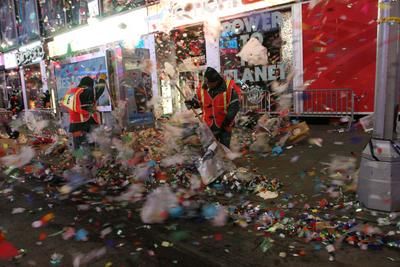
On New Year's Day, China Daily posted four of photos on its microblog, showing how littered New York's Times Square was after its year-end celebration. The post attracted 3,000 comments and 14,000 retweets. Among the retweeters was People's Daily, which drew 9,000 comments and 17,000 retweets of its own.
元旦那天,《中国日报》官方微博发布了四张照片。照片里的纽约时代广场垃圾遍地,是前一夜人们新年狂欢后留下的。这条微博收到了3000条评论,被转发14000次。其中人民日报也转发了这条微博,收到了9000条评论,被转发17000次。
China Daily's post was an oblique comment on the opinion that only Chinese show no respect for public sanitation. In a follow-up post, it added: "As the human flow for such fetes grows year by year, it becomes a common challenge for metropolises the world over for effective management of public spaces and its order and security while facing a sudden huge influx of visitors. We have paid a high price. But, in this age of global communication and traffic, it is ridiculous to discuss the issue in terms of racial quality."
只有中国人不注重公共卫生——中国日报的微博正是对这种看法的一种无声辩驳。中国日报在后续发布的微博中补充道:“随着狂欢规模年复一年增加,如何在人群密度陡然增大时,实施有效的公共区域管理以保障安全、维持秩序,是大都市集体面临的难题,也是已让我们付出惨重代价的新挑战。无论如何,国界逐渐消失、人员全球交流的时代,以肤色种族论素质是显而易见的愚蠢。”
The "high price" refers to the stampede in Shanghai on New Year's Eve in which 36 people died. "Racial quality" is a euphemism some critics assign to the inferiority of their compatriots when it comes to the less-than-desirable behavior in the public environment, such as littering, jostling and jumping the line.
“沉重的代价”指的是新年前夜发生在上海的踩踏事件,导致36人身亡。“民族素质”是一种委婉的说法。当提及社会地位较低的国人们在公共场合的不令人满意的行为时,如乱丢垃圾、拥挤推搡和插队等,一些评论家就会开始大谈民族素质问题。
It may not represent the mainstream voice of China, but there has always been an undercurrent of racism in China - against Chinese ourselves. Only in China would such a bad thing happen because Chinese are selfish, undereducated, scheming or too trustful, among other bad qualities, goes the argument.
这并不代表中国的主流声音,但中国总有一股民族偏见的暗流,诋毁我们中国人自己。他们认为,只有在中国才会发生如此糟糕的事情,因为中国人太自私,受教育程度低,善耍诡计,容易轻信别人。
This kind of statement derives from at least two sources: One is the tendency to blame a whole village for something done by an individual. A report of a serial killer would elicit a wave of responses saying that only a place so vile would spawn a creature like this. And a second possible source is the critical self-evaluation of scholars who scrutinize China's cultural soil for elements holding back its progress.
这种说法的出现有两个原因:其中一个就是人们总爱用一个人干的坏事去责备整个村子的人。如果报道说某地出现了连环杀手,人们就会臆断只有罪恶充盈的地方才会造就这么一个杀人恶魔。另一个可能的原因就是,一些学者们想要通过细察中国文化土壤来找到阻碍中国进步的因素,他们希望通过严格的自我审视来达到鞭策进步的目的。
The problem is, online denizens tend to accept the academic conclusions without delving into detailed analysis. The urge to generalize is so tempting and fits so neatly into the fast-food atmosphere of Internet expression that few have the patience to go through the travail of supporting one's arguments with evidence or rationalization. Online, the world is either black or white, with no room for shades of gray.
问题是,网民们倾向于不加深入分析便接受这种学术论断。如此以偏概全的见解很是吸引人,也很符合网络言论快餐式的氛围,因而很少有人会有耐心去思考它是否能找到证据支撑,它背后的逻辑是否讲得通。网络世界非黑即白,没有灰色地带可言。
That goes for both China and the United States as topics of contention. Especially China and the US - two countries used as points of reference for political grandstanding. If you are pro-China, you must be anti-America; and vice versa, or so some believe. It has become so simplistic, partly because of the 140-character limit of most arguments, that the best parts of a public discourse, the parts that involve new information or factual nuances, tend to be left out or ignored.
对于中美间极具争议性的话题而言也是如此。尤其是中国和美国——它们常常被放在政治秀中对立的两端。如果你支持中国,你就一定反美国;反之亦然,至少一些人是这样认为的。这种看法把复杂问题过于简单化,而其中部分原因是微博有140字的字数限制,公众话语中最精华的部分,那些包含新的信息和事实细节的部分就可能被省略或忽略掉了。